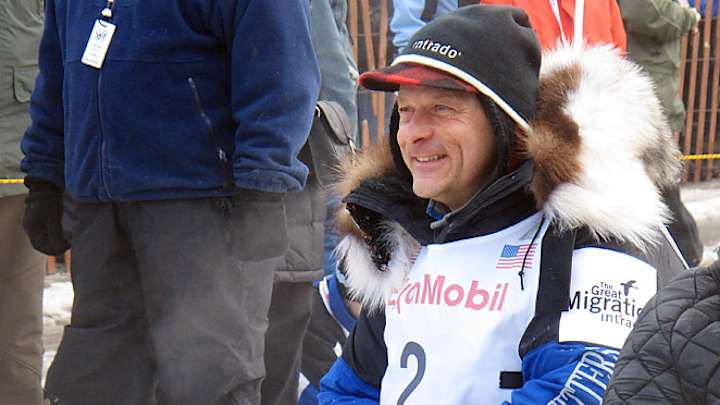Buser in position to capture fifth Iditarod victory

ANCHORAGE, Alaska (AP) -- Four-time champion Martin Buser held on to the lead Saturday in Alaska's Iditarod Trail Sled Dog Race, but his closest chasers were gaining on him, their dogs averaging faster speeds.
Buser is hoping to be only the second musher to ever claim a fifth title in the race's 40-year-history. But plenty of competitors were hot in pursuit in the 1,000-mile race. Teams have been traveling in deep snow followed by deep overflows in a trail on the Yukon River deteriorated by above-freezing temperatures. Some stretches also were marked by glare ice.
On the seventh day of the race, Buser was first to reach the checkpoint at Kaltag, 346 miles from the finish line in the old gold rush town of Nome on Alaska's western coast. The 54-year-old veteran from Big Lake, Alaska, arrived in Kaltag with 11 dogs at 2:24 p.m. Saturday. Earlier Saturday, he dropped two dogs at the checkpoint at Eagle Island.
Last year's runner-up, Aliy Zirkle, left Eagle Island with 13 dogs more than three hours after Buser, but her team traveled faster and she came within several miles of him before stopping her team to rest in a "nice and sunny spot" on the snow-covered Yukon River eight miles before Kaltag, according to veteran musher and former Iditarod racer Sebastian Schnuelle, who is traveling along the trail and keeping a blog on the Iditarod website. Schnuelle said he encountered Zirkle when he reached her by snowmobile.
"Her dogs had just finished a meal," he wrote. "When talking to her, she told me she did not want to run longer than 8 hrs, that is why she camped."
While stopped along the trail, Zirkle of Two Rivers, was overtaken by several mushers, including 2004 winner Mitch Seavey of Seward, who arrived in Kaltag at 3:37 p.m. Seavey was followed 30 minutes later by Aaron Burmeister of Nome.
Jake Berkowitz of Big Lake came in two minutes after Burmeister. Jessie Royer of Darby, Mont., arrived at 4:24 p.m.
According to sled positioning trackers, rookie Joar Leifseth Ulsom of Roros, Norway, also had reached Kaltag.
Royer has not yet taken a mandatory eight-hour rest required at one checkpoint along the Yukon River. All the other front-runners have taken their eight-hour rest, and Royer will have to take hers at Kaltag. That's the last checkpoint before teams begin the 85-mile run to Unalakleet, where the coastal run portion starts along the wind-battered Bering Sea coast.
Everyone has to take the second eight-hour layover at the checkpoint at White Mountain, 77 miles from Nome.
Heading into Kaltag, teams chasing Buser were traveling at faster speeds than his dogs, which could mean he has to rest them longer.
The front-runners are expected to reach the Nome finish line early next week.
The Anchorage Daily News reported Saturday that a badly ailing dog had been taken from Eagle Island to Kaltag, where it was being treated and could be flown out. A race judge said she didn't know whose team the dog belonged to.
Iditarod spokeswoman Erin McLarnon did not have details about the dog and another race official could not immediately be reached for further information. Many mushers left dogs behind at Eagle Island.
Buser tried a strategy early in the race that had many competitors shaking their heads, but he was hoping it would pay off by letting him get to Nome first. On the second day of the competitive portion of the race, Buser took his mandatory 24-hour rest at the checkpoint in Rohn after a blistering fast 170-mile run that had put him hours ahead of the other teams.
Since then, all the teams have taken their 24-hour rest.
Buser said he couldn't worry about the performance of others because he had no control over that.
"You got to just run it to the best of your abilities, not what other people are doing," he said Thursday in an Iditarod.com video. "It really just comes down to you and your dog team."
The first musher to reach Nome will win $50,400 and a new 2013 Dodge Ram pickup truck. The rest of the $600,000 purse will be split between the next 29 mushers to cross the finish line.
If Buser is first to Nome, he would be the second musher ever to win the Iditarod five times, joining only Rick Swenson of Two Rivers. Swenson, who in February withdrew from this year's race, last won the Iditarod in 1991.
The race began with 66 teams at a ceremonial start in Anchorage March 2. The competitive start began Sunday in Willow. Four mushers have scratched.
